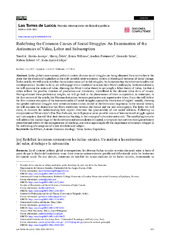Prikaz osnovnih podataka o dokumentu
Redefining the Common Causes of Social Struggles: An Examination of the Antinomies of Value, Labor and Subsumption
| dc.creator | Barria-Asenjo, Nicol | |
| dc.creator | Žižek, Slavoj | |
| dc.creator | Willems, Brian | |
| dc.creator | Perunović, Andrea | |
| dc.creator | Salas, Gonzalo | |
| dc.creator | Balotol Jr, Ruben | |
| dc.creator | Ayala-Colqui, Jésus | |
| dc.date.accessioned | 2023-11-15T09:23:50Z | |
| dc.date.available | 2023-11-15T09:23:50Z | |
| dc.date.issued | 2023 | |
| dc.identifier.issn | ISSN-e 2255-3827 | |
| dc.identifier.uri | http://rifdt.instifdt.bg.ac.rs/123456789/3223 | |
| dc.description.abstract | In the global contemporary political context, diverse social struggles are being alienated from each other to the point that the illusion of capitalism as the only possible socio-economic system is blurring all horizons of social change. In this article, we will aim to redefine the common causes of social struggles, by demonstrating their intersectionality and interdependence. In order to do so, we will engage with a number of concepts from Marx’s philosophy. In the introduction, we will examine the notion of value, claiming that Marx’s value theory is not simply a labor theory of value, but that it rather reflects the parallax structure of production and circulation, crystallized in the ultimate value-form of money. Having obtained these preliminary insights, we will go back to the phenomenon of labor in capitalism, to reinterpret, in the first section of the article, the Marxian distinction between productive and unproductive labor. From this will follow the first concrete examples of the intersectionality of social struggles against the abstraction of capital: namely, showing that gender and racial struggles have certain common causes, rooted in the Gramscian hegemony. In the second section, we will examine the distinction that Marx establishes between the formal and the real subsumption. The latter, we will claim, is decisive for understanding how capital structures the quasi-totality of our social relations. Following an interpretation of Maren Ade’s film Toni Erdmann, we will propose some possible means of intersectional struggle against real subsumption, that will find their theoretical backing in the concept of subversive universals. The concluding remarks will address the nuclear logic of the distribution and accumulation of capital, a symptom that survives throughout history preserved and driven by the omnipresence of ideology, and stress again implicitly the importance of common struggle in the unfreezing of emergence of a new revolutionary subject. | sr |
| dc.language.iso | en | sr |
| dc.publisher | Madrid : Ediciones Complutense | sr |
| dc.relation | "info:eu-repo/grantAgreement/MESTD/inst-2020/200025/RS//" | sr |
| dc.rights | openAccess | sr |
| dc.rights.uri | https://creativecommons.org/licenses/by/4.0/ | |
| dc.source | Las Torres de Lucca. Revista internacional de filosofía política | sr |
| dc.subject | Karl Marx | sr |
| dc.subject | Antonio Gramsci | sr |
| dc.subject | Ideology | sr |
| dc.subject | Value | sr |
| dc.subject | Labor | sr |
| dc.subject | Capitalism | sr |
| dc.title | Redefining the Common Causes of Social Struggles: An Examination of the Antinomies of Value, Labor and Subsumption | sr |
| dc.type | article | sr |
| dc.rights.license | BY | sr |
| dc.citation.issue | 12(2) | |
| dc.citation.spage | 201 | |
| dc.citation.epage | 210 | |
| dc.identifier.doi | 10.5209/ltdl.84516 | |
| dc.type.version | publishedVersion | sr |
| dc.identifier.fulltext | http://rifdt.instifdt.bg.ac.rs/bitstream/id/11099/bitstream_11099.pdf |

